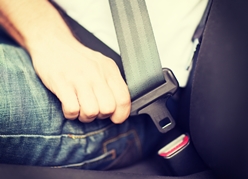The importance of wearing your seat belt every time you get into a vehicle cannot be overstated. This one little step can literally save your life if you are involved in an accident. However, even though buckling up has been the law of Georgia for years, people fail to use their seat belts—often with deadly results.
What Are the Seat Belt Requirements in Georgia?
Georgia’s requires its residents to wear seat belt laws to keep them safe. They require the following:
- All adult drivers aged 18 or older must wear a seat belt while driving or as a passenger in the front seat of a passenger vehicle. A passenger vehicle is any passenger vehicle designed to carry 10 or fewer passengers.
- All children ages 6 through 17 must wear a seat belt no matter where they are sitting in a passenger vehicle.
- All children under the age of six must be restrained in an age-and-weight appropriate child restraint device or booster seat.
- In 2016, Georgia law added pick-up trucks to the definition of passenger vehicles and requires the driver and passenger to comply with Georgia’s seat belt laws.
Violations of the seat belt laws could result in the person being issued a ticket and having to pay a fine. A police officer can stop any vehicle if he views a violation of these important laws. How Big of a Problem Is the Lack of Seat Belt Use?
According to the Centers for Disease Control and Prevention (CDC), use of seat belts by adults and children old enough to wear them is the most important way to reduce the risk of death or serious injury. The lack of seat belt use significantly contributed to motorists’ injuries and deaths in 2014:
- Of the 21,022 passenger vehicle occupants who were killed in crashes, 53 to 59 percent of teens ages 13-19 years old and adults from 20-44 years old killed were not wearing a seat belt.
- Young adult drivers and passengers between 18 and 24 years old have the highest rate of being injured in crashes and are the most likely adult age group to not wear a seat belt.
- Seat belt usage saved 12,802 peoples’ lives in 2014.
Dangers of Not Wearing a Seat Belt in the Back Seat
 While adult passengers are not required to wear a seat belt in the back seat of a passenger vehicle in Georgia, they should always wear one. Sadly, many passengers in the back seat do not follow this common sense safety rule, with the result being many preventable catastrophic injuries and fatalities every year. A recent Governors Highway Safety Association (GHSA) report documented how serious the problem is. It found that:
While adult passengers are not required to wear a seat belt in the back seat of a passenger vehicle in Georgia, they should always wear one. Sadly, many passengers in the back seat do not follow this common sense safety rule, with the result being many preventable catastrophic injuries and fatalities every year. A recent Governors Highway Safety Association (GHSA) report documented how serious the problem is. It found that:
- 883 individuals aged eight years old or older who were passengers in the back seats of vehicles and did not wear seat belts died in car accidents in 2013. At least 400 of them would be alive if they had worn their seat belts.
- Rear seat passengers are three times more likely to die in a crash if they do not wear a seat belt.
How Can Parents Encourage Children to Wear Seat Belts?
Having laws that require occupants of passenger vehicles to wear seat belts is only part of the battle. Parents should do the following:
- Setting a good example by always buckling up—even as a back seat passenger.
- Making sure children are properly buckled up in a car seat, booster seat, or seat belt every time they get into a vehicle.
- Making children 12 years old and younger sit in the back seat and making sure they are properly buckled up.
- Having children use the middle of the back seat whenever possible because it is the safest seat.
- Never putting a rear-facing car seat in front of an air bag.
Even if you were not wearing a seat belt, you could be entitled to compensation if a negligent driver caused you to suffer injuries. Do not let your lack of seat belt usage stop you from contacting an experienced car accident attorney who can help you minimize the potential harm this could cause to your claim. Start an online chat today to schedule a free, no-obligation consultation with me.
Related Links:
- How Georgia Accident Laws Affect Your Case
- 6 Common Car Accident Questions
- What Is the Statute of Limitations in My Car Crash Case?














